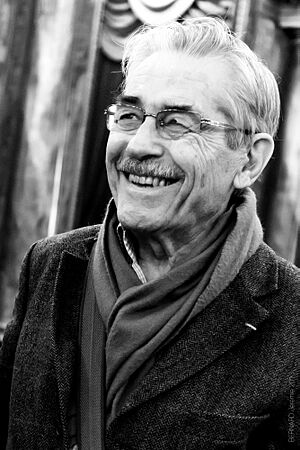Louis Pouzin facts for kids
Quick facts for kids
Louis Pouzin
|
|
|---|---|

Louis Pouzin en 2013.
|
|
| Born | 20 April 1931 |
| Alma mater | |
| Awards |
|
Louis Pouzin (born 20 April 1931) is a famous French computer scientist and a true Internet pioneer. He led the creation of the CYCLADES computer network in France during the early 1970s. This network used a brand new way to send information, which was very important for how the Internet works today.
His work was the first to use a method called the "end-to-end principle" in a large computer network. This idea became a basic rule for designing the Internet. The CYCLADES network was also the first to use a "datagram" model, which means data is sent in small, independent packages. His contributions were key to developing TCP/IP, the main set of rules that the Internet uses.
Contents
Biography
Early Life and Education
Louis Pouzin was born in Chantenay-Saint-Imbert, France, on April 20, 1931. He went to a well-known school called the École Polytechnique from 1950 to 1952.
Pioneering Computer Programs
While working at MIT (Massachusetts Institute of Technology), Pouzin helped design a system called Compatible Time-Sharing System (CTSS). Around 1963–1964, he wrote a program for it called RUNCOM. This program allowed computers to run a series of commands stored in a file. You can think of it as an early version of the command-line interface or a shell script that many computers still use today.
Pouzin also came up with the word shell in 1964 or 1965. He used it to describe the part of a computer system that lets users give commands, separate from the main "brain" of the system, called the kernel. His ideas were later used in another system called Multics and then became the basis for the Unix shell, which is still very common.
Developing Early Email
Working with other researchers, Louis Pouzin also helped describe an early e-mail system called "MAIL." This system allowed users on the same CTSS computer to send simple messages to each other. For example, it could tell users that their files had been saved. This was a very early step towards the email we use now, though it couldn't send messages between different computers yet. The idea for sending messages between computers came later in 1971.
Weather Forecasting System
From 1967 to 1969, Pouzin developed a special computer operating system for Météo-France, which is France's national weather service. This system used powerful CDC 6400 computers and was used for 15 years to help with weather forecasts and collecting weather data.
The CYCLADES Network Project
From 1971 to 1976, Pouzin led the important CYCLADES networking project at IRIA. Building on ideas from other researchers, he created the CIGALE network. This network was designed to send data in small pieces called "packets."
The CYCLADES project was crucial for researching how different computer networks could connect and work together, a process called internetworking. It used a "layered protocol architecture," which means it organized how data was sent in different steps. This layered approach is very similar to how the Internet is designed today.
Global Internet Collaboration
In June 1972, Pouzin helped organize a computer networking conference in Paris. There, he co-founded the International Network Working Group. This group played a big part in developing the ideas that shaped the Internet. His work was recognized by Bob Kahn and Vint Cerf, who are famous for creating the core Internet protocols.
Promoting Multilingual Internet
In 2002, Pouzin and his colleagues helped create Eurolinc. This is a non-profit group that works to make sure that website addresses (called domain names) can be used in many different languages, not just English. Eurolinc was even recognized by the United Nations to participate in important global discussions about the Internet.
In 2011, he started a company called Savoir-Faire. The next year, in 2012, he developed a service called Open-Root. This service allows people to create and use website addresses (called top-level domains) in all sorts of different writing systems, outside of the main system used by ICANN. This makes it easier for people around the world to create their own websites.
Awards and Recognition
Louis Pouzin has received many important awards for his pioneering work in computer networking:
- 1997 – He received the ACM SIGCOMM Award for his early work on sending data in independent packets.
- 2003 – The French government made him a Chevalier of the Legion of Honor, which is a very high award.
- 2012 – He was inducted into the Internet Hall of Fame by the Internet Society.
- 2013 – Pouzin was one of the first five people to receive the Queen Elizabeth Prize for Engineering, a major international award.
- 2016 – He received the Global IT Award.
- 2018 – He was promoted to Officer of the Legion of Honor, an even higher rank in the French Legion of Honor.
See also
- History of the Internet
- Internet in France
- Internet pioneers
- Protocol Wars
- Rémi Després
 | Roy Wilkins |
 | John Lewis |
 | Linda Carol Brown |

